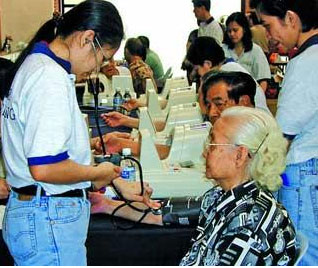A national health report card for seniors
As the Republic grapples with an ageing population, policymakers would soon have a snapshot of the state of health of seniors here - a database which would also enable them to formulate better-targeted prevention programmes - as preparations begin for a major islandwide health screening exercise.
More
details have emerged about the Health Promotion Board's (HPB) plans to scale up
the community health screening - which is being piloted in Jurong and Hong Kah
North - following the submission of tender documents to the Government's
procurement portal. 
According to the documents, the mass screening exercise will be rolled out to all other constituencies between March next year and March 2014.
It is expected to reach out to 3,000 Singaporeans and Permanent Residents aged 60 years and above - or less than 1 per cent of the entire population in that age group. Service providers are required to consolidate participants' records and screening results for the HPB.
This would enable the HPB to compile what is believed to be the first such database looking at functional health aspects such as vision, hearing, oral health, continence, mood and physical function.
Participants will have to pay S$5 for the health screening, with the Government subsidising S$25.
In response to TODAY's queries, HPB director (Healthy Ageing Divison) Shyamala Thilagaratnam said: "Functional decline among the elderly can be a major public health concern as Singapore ages rapidly. This is why the HPB has introduced functional screening for the elderly, to bring to light early symptoms, so that any age-related functional decline may be managed well and older adults can remain independent, active and engaged."
Following the pilot programme at Jurong, the HPB found that follow-up rates after the screening were between 35 per cent and 40 per cent. "Cost and perceived inconveniences of visiting a health professional" were the key hindrances, said Dr Shyamala.
According to the tender documents, the service provider for the nationwide health screening exercise will need to provide nurse counsellors on-site to interpret screening results and to advise participants on relevant follow-up treatments.
Dr Shyamala said the on-site follow-up will "close the loop on health screening for the elderly, by providing on-site care and consultation instead of post-screening referrals and follow-up".
Medical professionals who spoke to TODAY welcomed the mass screening exercise and data collection.
They noted that such information will allow doctors to understand elderly needs more accurately and raise awareness among seniors about their own health.
Dr Chia Shi-Lu, who is also a Member of Parliament (MP) for Tanjong Pagar GRC, noted that data collection is a labour intensive process. And with elderly patients moving between healthcare institutions, it is difficult to track the data, he said.
Dr Lily Neo, who is a general practitioner and also an MP, sees many elderly patients at her Tanglin Halt clinic.
She noted that the need to protect patients' confidentiality prevents doctors from providing data to the Ministry of Health.
Dr Neo said that data collection might be difficult as some elderly patients might also be unable to express their conditions accurately, while others might dismiss their discomfort as part of the ageing process.
With a national database, policymakers can come up with programmes "based on hard facts rather than perceptions", Dr Chia noted.
Dr Neo added that, for instance, if the nationwide screening exercise finds that a high proportion of seniors here are in depression, there could be a need for routine psychological assessment in future health screenings.
However, Dr Tan Tze Lee, a GP at Edinburgh Clinic, pointed out that seniors who voluntarily go for health screening are usually those who are interested in their health and the data compiled might not be representative of the general population.
Which is why grassroots leaders should get as many of their residents as possible to be involved in the nationwide health screening, he said.
The HPB should also help those who cannot afford the S$5 screening fee, he added.
Senior citizen Henry Tan, 64, noted that cost is what deters seniors from participating in health screenings. He said: "With the information ... it could provide seniors a better idea of what kind of health conditions to take note of."
Today
The mass screening exercise will be rolled out to all other constituencies between March next year and March 2014. (TODAY File Photo)

